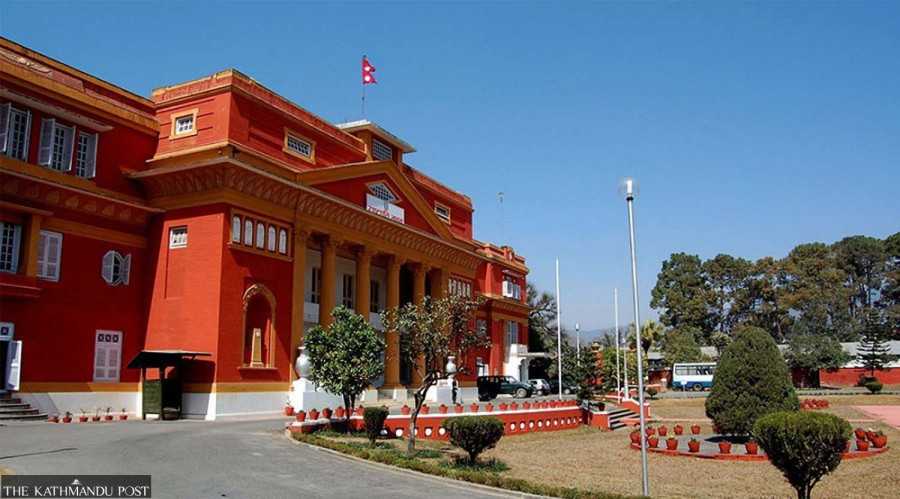National
Parties scramble for response to Sheetal Niwas subterfuge
PM consults legal experts, who suggest multiple options.
Binod Ghimire
National politics has been sharply polarised in the aftermath of President Bidya Devi Bhandari’s refusal to authenticate the bill to amend the Citizenship Act within the constitutional deadline.
The ruling coalition has concluded that Bhandari’s move was unconstitutional, therefore, deserved condemnation. In a joint statement, four of the five parties in the alliance urged the Nepali people to stand against her steps.
However, coalition partner Rastriya Janamorcha has refrained from signing the joint statement.
Vice President Nanda Bahadur Pun too has joined the chorus criticising Bhandari, saying that a situation in which the custodian of the constitution has herself violated it is disheartening. “There can be no excuses for the guardian and the protector of the constitution not to abide by it,” reads Pun’s statement.
Cadres of the ruling CPN (Maoist Centre) and the Janata Samajabadi Party held demonstrations against Bhandari in different parts of the country, claiming her move not just flouted the constitution but also deprived hundreds of thousands of people of their right to citizenship. Loktantrik Samajbadi Party and CK Raut’s Janamat Party too held protests in different districts of the Madhesh Province.
On the other hand, the Youth Association Nepal, a wing of the CPN-UML, marched in the streets welcoming the President’s decision to not authenticate the bill, which it said has anti-national provisions. The party’s leadership, however, has maintained silence on the issue.
Concluding that the President’s move was unconstitutional, Prime Minister and Nepali Congress President Sher Bahadur Deuba consulted legal experts seeking suggestions to prepare the government’s reaction.
Law experts said the issue is a constitutional matter and should be resolved by the Supreme Court. Some experts also said as the constitution clearly says the President must authenticate the bill forwarded twice by Parliament, it has automatically become a law.
“The constitution hasn’t envisioned what happens if the President refuses to authenticate a bill,” Gopal Krishna Ghimire, chair of the Nepal Bar Association who was present during the consultation, told the Post. “The President has breached the constitution by refusing to authenticate the bill. The government, therefore, can now bring it into force after publishing it in the Nepal Gazette. Let’s see what the government does.”
Article 113 (4) of the constitution says if the President sends back a bill along with any remarks and if both houses of Parliament reconsider the bill as it was presented or with amendments, and pass it and present it again to the President, the bill shall be certified by the President within 15 days of its submission.
Some constitutional experts believe the President who doesn’t abide by the constitution deserves to be impeached. However, as impeachment is not possible in the absence of the House of Representatives, the only available solution now is seeking the Supreme Court’s intervention.
“That is the way to correct the President’s unconstitutional move,” Anup Raj Sharma, a former chief justice, told the Post. “The constitution can also be amended with a provision that a bill endorsed by the federal parliament for the second time will automatically become law even if the President refuses to authenticate it in 15 days. But in the absence of the lower house, it is currently not possible to amend the charter.”
He added that it was unethical of the President to continue in the position even after her refusal to fulfil her constitutional responsibility. “If she didn’t want to authenticate the bill, she should have resigned.”
Bhandari’s rejection of the bill has invited a confrontation between the head of the state and the head of the government.
As the souring of relationship between Sheetal Niwas and Singha Durbar will do no good to the nation and the reputation of state organs, efforts should be aimed at finding an amicable solution, said some constitutional experts.
Bipin Adhikari, a professor and former dean at the Kathmandu University School of Law, says the government can issue an ordinance addressing some of the President’s concerns, mainly over the cooling period for marital naturalisation of foreign women married to Nepali men. “Issuing an ordinance, in consensus, by addressing some of the concerns of the President is the best way to end the current standoff,” he told the Post. “If that is not possible, let the Supreme Court settle it.”
Meanwhile, some lawyers have already moved the Supreme Court with at least two writ petitions challenging the President’s inaction. “We have received a couple of writ petitions challenging the President’s decision not to authenticate the amendment bill on the Citizenship Act,” Bimal Poudel, spokesperson at the court, told the Post. “We will decide whether to accept the petitions after a study on Thursday.”
The petitioners have demanded the Supreme Court’s order to the President to authenticate the bill as per her constitutional obligation. “The President has flouted the Constitution of Nepal by not authenticating the bill that was endorsed by the federal parliament twice. Similarly, her step has deprived citizenships to hundreds of thousands of people,” advocate Sunil Ranjan Singh, who has knocked the Supreme Court’s door, told the Post. “I have sought a mandamus order that forces the President to authenticate the bill.”




 10.12°C Kathmandu
10.12°C Kathmandu















